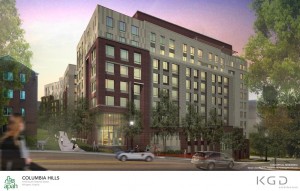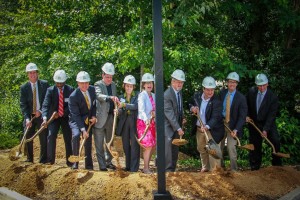Arlington Partnership for Affordable Housing Breaks Ground on Columbia Hills
 Arlington Partnership for Affordable Housing (APAH) broke ground on its newest project, Columbia Hills Apartments, which will be located at 1010 S. Frederick Street in Arlington. In a blustery but spirit-filled celebration, APAH’s finance, design and building partners, elected officials, neighbors and APAH leaders gathered to launch construction on the 229-unit building.
Arlington Partnership for Affordable Housing (APAH) broke ground on its newest project, Columbia Hills Apartments, which will be located at 1010 S. Frederick Street in Arlington. In a blustery but spirit-filled celebration, APAH’s finance, design and building partners, elected officials, neighbors and APAH leaders gathered to launch construction on the 229-unit building.
With a sentiment echoed throughout the proceedings, Libby Garvey, Chairman of the Arlington County Board, praised the Columbia Hills project as “a wonderful example of what we can do when everyone works together for the community. Today there are just 9,600 affordable homes in Arlington, yet there are 17,000 low income families here in our community right now in need of affordable homes.”
M&T Bank, who in partnership with APAH, donated the 1.2 acres of land on which Columbia Hills will be built, was a critical early partner. Speaking at the celebration, John Mangan, Vice President for Commercial Real Estate Finance at M&T Bank, stated “we all succeed when the communities where we live, work and play succeed. In a high price region like Arlington, land is one of the largest obstacles to growing our stock of affordable housing. Columbia Hills is one of the largest donations M&T has ever made and I can’t think of a better cause, group or project for our support.”
Delegate Alfonso Lopez (VA-49th District) expressed his gratitude for the support of the Virginia Housing Trust Fund, an affordable housing fund he championed in the legislature, but noted “today is a great day, but we must do more. Solving Virginia’s housing crisis is essential to economic growth, to creating jobs and to building thriving communities. Today, as we begin Columbia Hills, APAH and everyone here is taking a giant step forward to expand affordable housing here in Northern Virginia.”
Closing the festivities, Nina Janopaul, APAH President and CEO, observed “it is incredible what this community can accomplish when we link arms and muscle through complicated projects like Columbia Hills. We do it because we believe in this cause; we believe in the diversity of our community and we believe that Arlington is stronger when the 17,000 low income families who are our friends and neighbors are able to stay here in our community.”
 Columbia Hills Apartments is one of the first projects to be developed under the Arlington County’s award-winning Columbia Pike Neighborhoods Plan and will contribute significantly to meeting the Plan’s goal of preserving 3,000 affordable homes along Columbia Pike. The building will be an attractive, new, eight-story apartment complex that includes community rooms for resident programs and a relocated playground for young children. The property includes 10 permanent supportive housing units and 13 accessible units to meet the diverse needs of the community, including senior and disabled residents who cannot live comfortably in the neighboring Columbia Grove walk-up apartments.
Columbia Hills Apartments is one of the first projects to be developed under the Arlington County’s award-winning Columbia Pike Neighborhoods Plan and will contribute significantly to meeting the Plan’s goal of preserving 3,000 affordable homes along Columbia Pike. The building will be an attractive, new, eight-story apartment complex that includes community rooms for resident programs and a relocated playground for young children. The property includes 10 permanent supportive housing units and 13 accessible units to meet the diverse needs of the community, including senior and disabled residents who cannot live comfortably in the neighboring Columbia Grove walk-up apartments.
Built on 1.2 acres of APAH’s land adjacent to our Columbia Grove Apartments, Columbia Hills will provide a total of 229 homes, including 64 studio apartments, 27 one-bedroom units, 110 two-bedroom units, and 28 three-bedroom homes. All apartments are affordable to low income households earning 60% or Area Median Income (AMI, including 10 for households below 40% AMI and 39 for households below 50% AMI.
Located at 1010 Frederick Street, just a block off Columbia Pike, Columbia Hills is an innovative and highly efficient $91M project that includes land donated by APAH and M&T Bank, , federal Low Income Housing Tax Credits (LIHTC), innovative hybrid financing. Arlington County loaned $18.5 million from its Affordable Housing Investment Fund (AHIF) project which will repaid back by APAH into the County’s revolving fund. Additional funding is being provided by the Federal Home Loan Bank of Atlanta and the Virginia Housing Trust Fund
Speaker at the groundbreaking included:
Re. Andrew Merrow, Rector, St. Mary’s Episcopal Church
John Milliken, Chairman, APAH Board of Directors
Libby Garvey, Arlington County Board Chair
Dale Wittie, Director, Rental Housing, VA Housing Development Authority, VHDA
Derrick Perkins, Senior Vice President, Community Development Lending, Bank of America Merrill Lynch
John Mangan, Vice President, Commercial Real Estate Finance, M&T Bank
Chris Thompson, Deputy Director of Housing, Virginia Department of Housing and Community Development
Alfonso Lopez, Virginia House of Delegates (49th District)
Nina Janopaul, APAH President and CEO
Please find the property sheet here with more information on the project.







